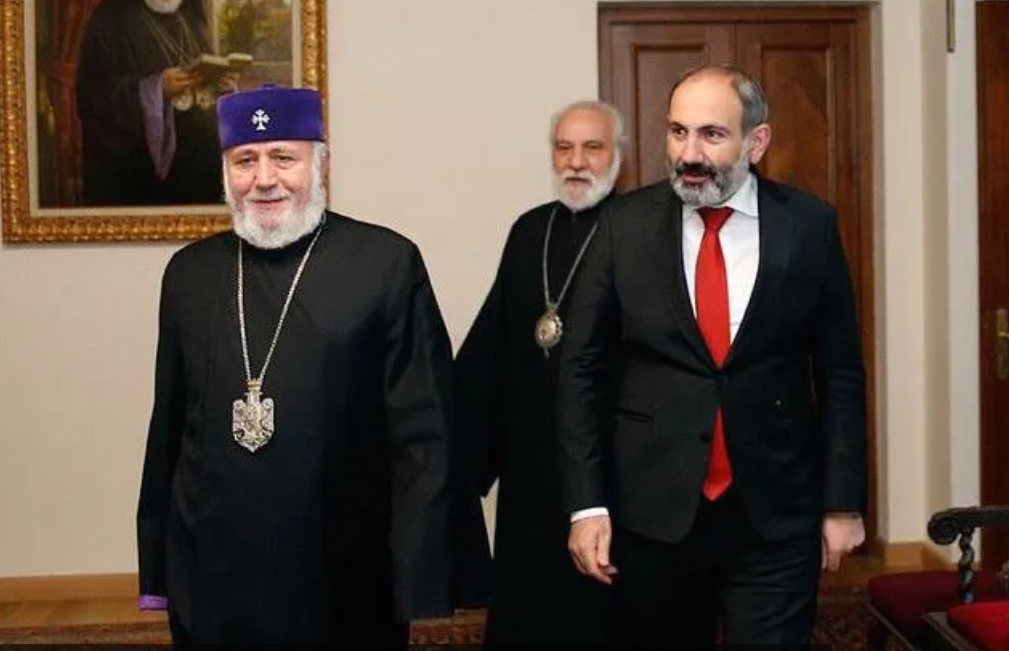Arrests and accusations of attempted coup: open conflict between the government and the Armenian Church
Two archbishops (including Galstanyan) are in prison after a police raid on the patriarchate in Echmiadzin. Pashinyan directly accuses Catholicos Karekin II and calls for his removal, while the Armenian clergy responds by invoking the excommunication of the prime minister. According to the government, Moscow is behind the Church's ‘manoeuvres’, but other voices denounce the use of branding all opposition with ‘the stamp of Kremlin spies’. In the background are geopolitical balances and negotiations with Azerbaijan.
Yerevan (AsiaNews) - Armenia is deeply shaken by Prime Minister Nikol Pašinyan's accusation of an attempted coup allegedly prepared by some bishops and priests of the Armenian Apostolic Church, traditionally very pro-Russian, led by two archbishops, Bagrat (Galstanyan) and Mikael (Adžpayan), who were arrested along with 15 other people. The group of ‘criminal oligarchic clergy’, as defined by the prime minister, allegedly led the ‘Holy Struggle’ movement against the government and the country's institutions, opening ‘a closet full of junk’. The prime minister also accused the Armenian patriarch, Catholicos Karekin II, of being Armenia's “first mafioso”, transgressing all the commandments “starting with that of chastity”.
The head of government called for the patriarch to be replaced, and the Armenian clergy responded that Pashinyan ‘should be excommunicated and excluded from the Church along with his wife’. The controversy reached fever pitch with the arrest of Russian-Armenian billionaire Samvel Karapetyan, head of the Tašir commercial and construction group, a supporter of Karekin II, who was arrested on charges of calling for the overthrow of the established order. Almost a hundred searches were then carried out, arresting several opposition politicians such as the deputy of the Armenia bloc, Artur Sarkisyan, and one of the leaders of the Dashnaktsutyun party, Igor Sarkisyan, together with a deputy from the former Armenian Nagorno-Karabakh, David Galstyan.
The raids reached Holy Ečmjadzin, the seat of the Armenian Patriarchate, where Karekin II himself, together with the assembled priests, tried to prevent the arrest of Archbishop Adžpayan, while the latter's residence in Gyumri was ransacked by security agents, and he himself surrendered to the police. He has now been placed in a cell with his brother Galstanyan, “to spy on their conversations”, according to opposition critics.
The controversy has also taken on surreal characteristics, with accusations that Pašinyan is circumcised, although it is not known whether he is Jewish or Muslim, and the prime minister has declared that he is ready to prove the falsity of the claim anatomically to Karekin II himself, inviting him to his home to verify. Several coup plans were then published according to the searches, with accusations that the Kremlin was behind the bishops and their followers in order to destabilise the political situation in Armenia, which under Pashinyan's government is moving increasingly towards Europe and away from Moscow.
The conspirators allegedly intended to form groups of 25 people, and the commanders of these units were not to know each other. The actions to be carried out were to disrupt the banking system's internet connections, organise road accidents to paralyse traffic around barracks and police stations, and instigate street protests until the government was overthrown. The composition of the new government that was to take power after this kind of “revolution” was also published, consisting of politicians and businessmen who were clearly pro-Russian and pro-Putin for political and economic reasons.
Critical voices, such as that of journalist Aza Babyan, believe that this persecution of the Armenian Church and those close to it is typical of Pašinyan's policy, “who reacts to any expression of opposition with the stamp of Kremlin spies”. The prime minister is reportedly preparing for next year's local elections, which could be decisive for Armenia's future, especially in the regions bordering Azerbaijan, such as Tavush and Gyumri, where the two arrested bishops are based. The victory of the government's line of overcoming conflicts and stopping “dreaming of the Armenia of the past” could finally lead to the definitive conclusion of peace with Azerbaijan, which remains unresolved, and open up a future of peace for Armenia and the entire region.
07/02/2019 17:28







.png)










